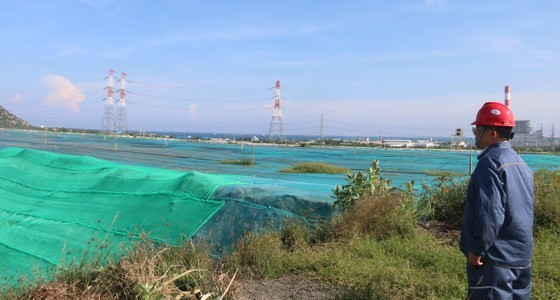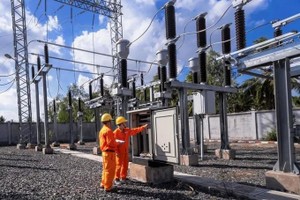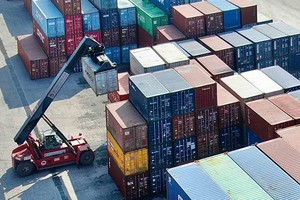 |
Currently, there are over 12 million tons of ash and slag from thermal power plants in Binh Thuan stored at various storage yards. |
At the ash and slag storage yards of the four thermal power plants in Binh Thuan Province, namely Vinh Tan 1, Vinh Tan 2, Vinh Tan 4, and Vinh Tan 4 expansion, the number of trucks transporting ash and slag for burial is relatively low as most of it has already been sent for consumption. Ms. Nguyen Thi My Ngoc, Head of the General Administration Department at Vinh Tan 2 Thermal Power Plant, said that currently, the ash and slag have been certified to meet several standards for use as leveling material, concrete production, road construction, and as mineral additives for roller-compacted concrete. The plant utilized more than 1 million tons of ash and slag in 2022. In 2023, with the signing of three contracts, the plant has effectively consumed all the ash and slag generated during the production process.
Likewise, the representative from Vinh Tan 1 Thermal Power Plant reported that, during the first nine months of 2023, the total amount of ash and slag waste generated from the plant's production process exceeded 1.1 million tons, with over 811,000 tons having been put to use. Mr. Pham Hai Dang, Head of the Ash and Slag Consumption Management Department at Vinh Tan 1 Thermal Power Plant, revealed that numerous units are submitting bids to participate in auctions for the ash and slag. As a result, the ash and slag produced by the plant on a daily basis is largely consumed shortly after it is generated.
Mr. Vu Thanh Hai, Director of Vinh Tan 4 Thermal Power Plant, stated that, at present, the ash and slag produced during the plant's operation are almost utilized entirely.
Nonetheless, as reported by thermal power plants, the majority of the consumed ash and slag is primarily used as a raw material for cement production. Meanwhile, the utilization of ash and slag for purposes like leveling material and road construction is still hindered by procedural and regulatory challenges. Consequently, thermal power plants can only manage to utilize the daily-generated ash and slag, while the stockpile of ash and slag accumulated over several years remains substantial. To date, the total stored ash and slag in the facilities of the four thermal power plants has exceeded 12.3 million tons, with Vinh Tan 2 Thermal Power Plant holding more than 7 million tons and Vinh Tan 1 Thermal Power Plant having over 4.3 million tons.
Mr. Nguyen Minh Duy, Head of the Department for Construction and Technical Infrastructure Management at the Department of Construction of Binh Thuan Province, pointed out that even though the Prime Minister has instructed the Ministry of Natural Resources and Environment to establish technical standards and guidelines for the treatment and utilization of ash, slag, and gypsum to restore areas where mineral exploitation has ended, these standards have not been issued by the Ministry as of now. Therefore, the province lacks the essential guidance to instruct local entities.
The utilization of ash and slag from thermal power plants for leveling is subject to stringent requirements set forth by the Ministry of Construction. These requirements include a minimum 2mm HDPE liner, water quality testing at the leveling site, and radiation safety measures. These rigorous standards have presented significant challenges for investors seeking to use such materials. Consequently, Binh Thuan Province has proposed that the Ministry of Construction promptly review and adjust these requirements to make them more suitable. As for the use of ash and slag as construction material for road infrastructure, the Ministry of Transport has not yet finalized and supplemented technical standards, regulations, and associated guidelines, leading to implementation difficulties at the local level.
























